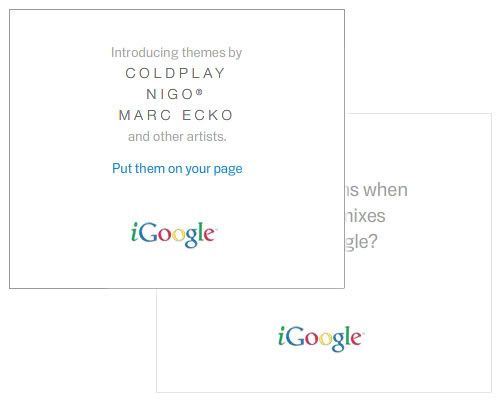As a consumer - and an inbox owner - email marketing can range from highly effective wildly annoying and irrelevant. The respective consequences can lead to activity / purchases or permanently blocking emails by classifying them as SPAM.
As a marketer, email marketing is a highly effective medium to drive user retention, promote new features / products and relay important news.
Andrew Chen, author of the Futuristic Play blog, recently wrote that 'depending on notification-driven retention sucks'. The key word there is 'depending'. In reality, you never want to depend on anything - whether its SEO, SEM, direct traffic, referrals, etc. It's too risky and often places control in other player's hands. Unlike most of his work, I disagree with Andrew here: when done right, notification-driven retention is:
1. a critical lever to engage and reengage users 2. an opportunity to standout among the clutter of web and reach user's in their preferred setting (whether it be .com, email, mobile, etc) 3. an opportunity to convert traffic into direct, more active users
Furthermore, I found Andrew's article ironic as allows users to subscribe to his blog via email, citing "I don't write often, so sometimes the easiest thing to do is to subscribe to my blog (which you can do below)"... sounds like notification-driven retention right?
Focusing on email, here are a few forms of notification-driven retention - ranging significantly in effectiveness. While I've chosen to focus on email for this post, notifications can exist in numerous forms. Twitter and Facebook are terrific examples. My entire Twitter experience is predicated on notifications (both as a pusher and a puller). If I had to visit Twitter directly each time, I would certainly be a less-engaged user and perhaps wouldn't even be a user. 90% of my Facebook visits begin with an SMS or email alerting me of new activity (friend, email, connection, etc).
Below are a variety of different emails. Some are terrific. Some trigger my SPAM filters (and rightly so).
Amazon = Best in Class. I read nearly every Amazon email I receive. They deliver content based on my purchases and site activity - and they tell me that in the email: "As someone who has shopped for high-def players or high-definition movies and games..." They know that I'll be interested in the offers and the major discounts. I actually enjoy these emails and regularly start my shopping from them.

iTunes = I Tune These Out. I have written about how untargetted and irrelevant iTunes emails are. Here is the most recent: a spotlight for iTunes latest videos... but this is worthless to me as I have NEVER bought an iTunes video. If you are going to send me spotlight emails - make sure that the spotlight fits my filter... by not doing so, this email appears exclusively commercial, demonstrates no relationship we me, and fails to get me back to iTunes.

JCrew = SPAM. This is the worst big-brand email I've received. First, it comes from "crewcuts" - when I saw that on my blackberry, I immediately assumed it was SPAM and deleted it (attention marketers: every component of an email is important - including the sender's name!). More disturbing parts about the email: I don't have a son, I don't need to shop in 'boys swimwear' and there isn't a single other message in the email (even if I wanted to find something that might interest *me* on JCrew.com).
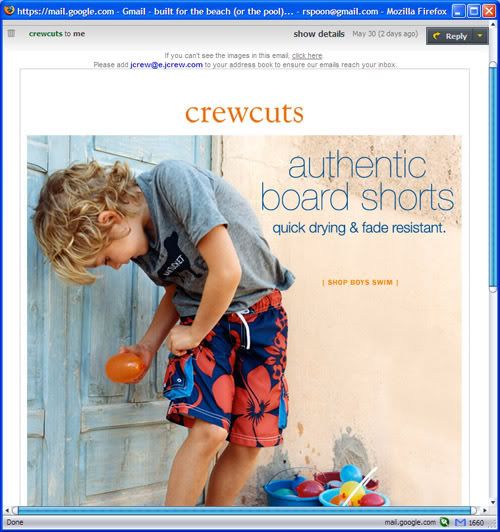
Live Nation = I Look Forward to These. Live Nation has email marketing down: send scheduled emails that are relevant based on geography, highlight upcoming and new shows and give readers an incentive to open them (ie exclusive news, pricing, etc). I always open these emails as, sadly, it's a way for me to stay current with music.
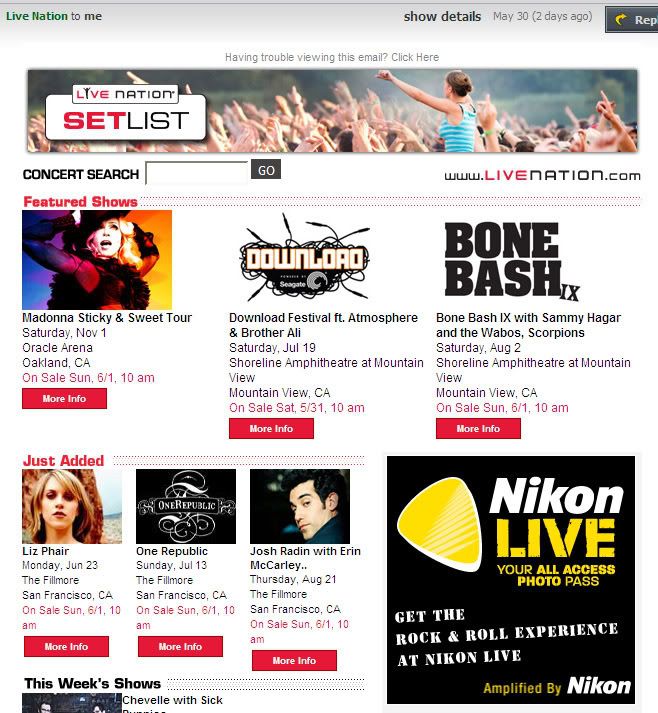
Social Median = News in My Network. I registered with Social Median precisely to receive these notifications. Social Median works on my behalf to find new content that is relevant to the interests and topics that I previously designated. They then send scheduled emails that deliver this news. As reader, I always scan the headlines (usually on my blackberry). As a publisher, I know that other readers do the same (I get a fair amount of traffic from Social Median).
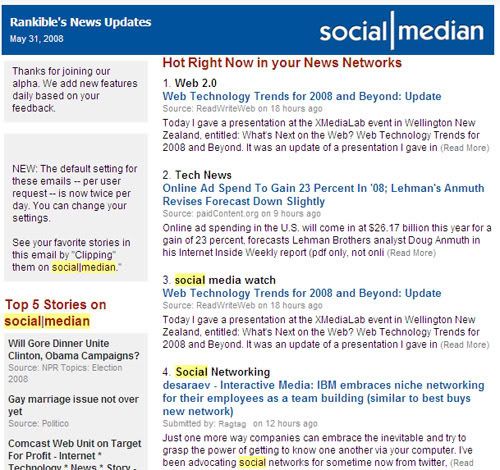
Google Alerts = Customized Notifications. I love Google News and have dozens of alerts created. Some arrive instantly and some are scheduled to deliver daily summaries. Google knows that by enabling users to create customizable notifications, they drive News activity and retention. Again, I look forward to these emails and receive dozens of them a day (which is my choice remember!).
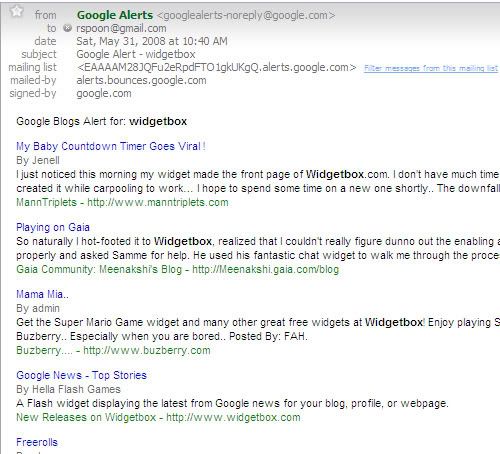
Speaking of email - you can now subscribe to this blog via email. Just enter your email address into the box on the left side-bar. It's powered by Feedburner.


